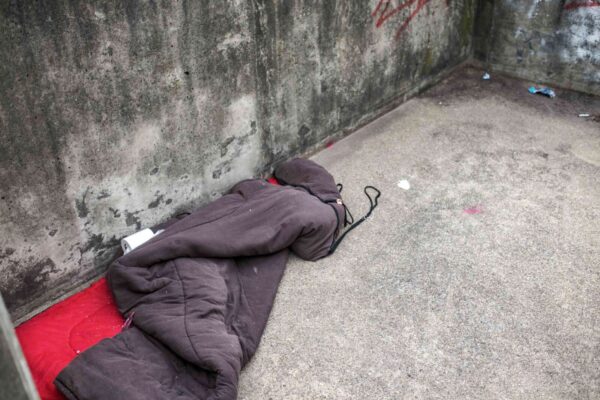
Local nonprofits and the Arlington County government have received $3 million in federal funding to address homelessness.
Nearly $200,000 will go to two new programs from the organizations Doorways and PathForward, formerly A-SPAN. The rest — save for about $81,000 for the county — will support existing programs provided by Bridges to Independence, Doorways, New Hope Housing and PathForward.
“This HUD funding helps ensure survivors of intimate partner violence have access to housing and additional pathways out of shelter, so that they can find healing, harbor, and hope for a brighter future,” Doorways President and CEO Diana Ortiz told ARLnow in a statement.
To date this year, Arlington has received $4.2 million from the U.S. Department of Housing and Urban Development to combat homelessness.
“HUD funding is a vital part of Arlington’s efforts to prevent and end homelessness,” said Arlington County’s Department of Human Services Director Anita Friedman in a statement.
“This announcement confirms that our strategic planning, policy development, and service delivery are effective and that we are changing lives for individuals and families who are experiencing homelessness or are at risk of becoming homeless,” she continued.
The county delivers these services in a partnership with local nonprofits called the Arlington County Continuum of Care (CoC). For more than a decade, the CoC has worked to improve the county’s response to homelessness by focusing on providing permanent housing, working with 1,070 people in 2022, per the county.
Nonprofits receiving this money will use it in one of two ways. The first, called “rapid rehousing,” places people living on the street or in an emergency shelter in existing, empty affordable apartment units. The second, called “permanent supportive housing,” combines housing with services such as health care and employment help.
The funding breaks down as follows:
- Doorways: $127,398 for a new rapid rehousing program
- PathForward: $1.85 million for four existing programs and $68,116 for a new permanent supportive housing program
- New Hope Housing: $586,269 for three existing programs
- Bridges to Independence: $289,419 for an existing rapid rehousing program
“HUD grant funding supports a broad array of interventions designed to assist individuals and families experiencing homelessness, particularly those living in places not meant for habitation, located in sheltering programs, or at imminent risk of becoming homeless,” per a county press release. “Because grants are competitive, localities must demonstrate need as well as an ability to address those needs.”
Arlington has demonstrated that ability in the past, when, in 2015, it functionally ended homelessness for veterans, according to a presentation on the county’s efforts.
That does not mean Arlington literally eradicated homelessness for former service members, however.
Rather, it means that the number of actively homeless veterans is less than or equal to the average monthly rate at which individuals and families find and move into stable housing, per the presentation. This is known as “functional zero.”
Arlington aims to reach functional zero for all populations experiencing homelessness by 2026, which would mean seven or fewer single adults and three or fewer youth and families with children actively experiencing homelessness at one time.
To reach this goal, Arlington is partnering with Community Solutions, which is a nonprofit dedicated to ending homelessness, and updating its strategic plan. As part of that process, the county held listening sessions earlier this year to discuss how homelessness affects specific population groups and hear solutions from the community.
In the presentation, Community Solutions representative Elise Topazian said Arlington is on the right track. Over the last 12 years, the Continuum of Care reduced overall homelessness by 66%, including a 52% reduction in sheltered and 90% reduction in unsheltered homelessness.
“Arlington is on the brink [of] ending chronic homelessness,” Topazian said.

Drug use intervention programs for youth are in short supply in Arlington County, according to people who help youth with substance dependencies.
The need is particularly acute for younger teens, as the onset of exposure to and abuse of drugs is trending younger, National Capital Treatment and Recovery Clinical Director Pattie Schneeman said in a recent panel.
“‘There’s nothing out there for adolescents.’ I hear it all the time,” says Schneeman, acknowledging that National Capital Treatment and Recovery, formerly Phoenix House, stopped serving children in 2015 because insurance reimbursements did not cover operating costs.
“If you have money, you can send someone to a posh program. You can pay for services,” she continued. “But if you are average, middle-class or a low socioeconomic family, you have no resources, and it is very sad and devastating to our communities.”
Arlington is seeing a rise in youth obtaining and using opioids, with an increasing number overdosing both on and off school grounds — or effectively detoxing in the Northern Virginia Juvenile Detention Center in Alexandria. In some cases, they are prescription, but in many others, they are buying illegally manufactured pills laced with the deadly drug fentanyl, from local gangs or through social media, police say.
The death of 14-year-old student Sergio Flores after a fatal overdose at Wakefield High School has driven teachers, parents and School Board members to call for more action and support from APS and Arlington County. Conversations since then have revealed the barriers throughout the continuum of care to actually treating kids.
For instance, school-based substance abuse counselors can only educate — they cannot provide treatment, according to School Climate Coordinator Chip Bonar, while appropriate treatment options can have a months-long waitlist. The division of the Arlington County Dept. of Human Services that works with children and behavioral health has 43% of its job positions unfilled and acknowledges there are few residential substance use treatment options.
It will be at least two years before VHC Health — formerly Virginia Hospital Center — opens its planned rehab facility. Two years is a long time, however, considering that less than a month passed between the death of Flores and a near-fatal teen overdose Wednesday.
To beef up treatment options, and expand services in the nearer term, Arlington is turning to settlements with manufacturers, distributors and pharmacies it alleges have been key players in the opioid epidemic. Just last week, the Arlington County Board agreed to participate in a proposed settlement against Teva, Allergan, Walmart, Walgreens, CVS and their related corporate entities.
The Board voted to approve the settlement in an unannounced vote at the end of a lengthy meeting.
“This is the latest in a series of settlements that are part of the larger National Opioid Settlement,” said county spokesman Ryan Hudson. “The total funding awarded to the County from these agreements continues to evolve as more settlements are finalized. All opioid settlement funding will be used on approved opioid abatement purposes.”
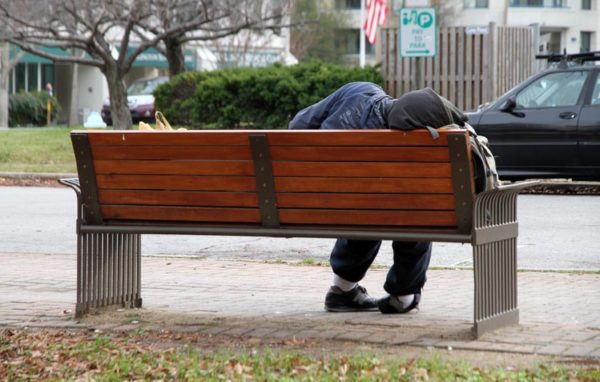
Arlington County has received a $1.2 million federal grant to move people experiencing homelessness into permanent or temporary apartment housing.
Approximately 55% of the grant will be for housing — mostly one- and two-bedroom affordable rental units — and the remainder “is for supportive services and staffing,” says Dept. of Human Services spokesman Kurt Larrick.
This project provides permanent housing in existing, but unoccupied, committed affordable units in Arlington to people either living outside or in one of the county’s four emergency shelters, operated by Bridges to Independence, Doorways, New Hope and PathForward.
In federal government speak, this is known as “rapid rehousing,” says Larrick.
It is part of Arlington County’s “housing first” approach — one in which people are housed without stipulations, says Adele McClure, a candidate for the second district of the House of Delegates, who has worked for many years in Arlington tackling homelessness after experiencing it herself in Fairfax County.
“It’s breaking down the barrier to housing,” she said. “I am a product of those stipulations growing up. When I was in transitional housing, we didn’t have ‘housing first’ model, it was really, really tough for our family. I am thankful Arlington and all of Virginia engages in that.”
The funds will also pay for master-lease agreements with nonprofits to move people into apartments temporarily before moving to permanent housing, Larrick said.
This grant has a three-year term. It is a new funding source and a new U.S. Department of Housing and Urban Development (HUD) project type for Arlington.
“But the work is not new to Arlington and will be a mix of non-congregate shelter and Rapid Rehousing services for people experiencing homelessness,” Larrick said. “Arlington has a long history of winning competitive HUD funding opportunities across a range of programming areas though.”
McClure says Arlington is well-positioned to address homelessness because of its “continuum of care” model that brings together nonprofits, affordable housing providers and public and private service providers to oversee everything from subsidy programs to street outreach.
The funding will help replace early Covid relief federal funding through the CARES Act, which is coming to an end, she noted.
The grant comes as the county is working on its next strategic plan to help households at risk of homelessness keep their housing and help homeless families quickly regain stable housing.
Arlington County adopted a 10-year plan in 2006. Data over the last decade show that during the out-years of the plan, the population of people living in shelters and outdoors dropped sharply. That rate of decline has since slowed and possibly plateaued.
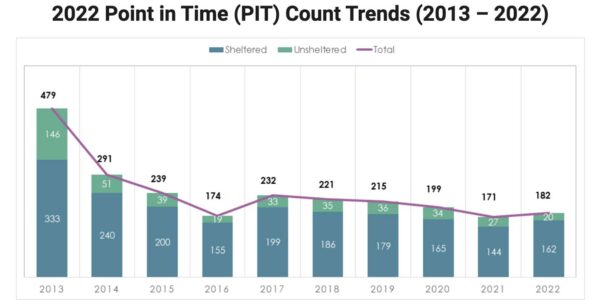
“We started off really strong and we had that sharp decline, but once you get down to the lower numbers we have, we’re going to get down to the folks who are hardest to serve: those are the folks who don’t necessarily stay sheltered,” McClure said. “I know, here in Arlington, we are concerned about losing that momentum and progress.”
A three-year plan was adopted in 2018. The plan was extended due to Covid, but now, the county is reprising its planning. This round is focused on addressing inequities for people of color, immigrants and seniors.
“Arlington struggles with the availability of resources, funding and stock of affordable housing,” McClure said. “There are large and systemic root causes that perpetuate homelessness… Arlington is trying to address those systemic root causes.”
Interested community members can attend any of the following informational sessions.
- Understanding the Role of Racial Equity in Arlington’s Continuum of Care — Friday, Feb. 17 from 12:30-2:30 p.m. at the Arlingotn Central Library Auditorium (1015 N. Quincy Street)
- Domestic Violence & Homelessness — Saturday, Feb. 18 from 10 a.m. to noon at the DHS Lower Level Auditorium, Sequoia Plaza 1 (2100 Washington Blvd)
- Family Homelessness — Wednesday, Feb. 22 from 5-7 p.m. at the Central Library Auditorium
- Single Adults Experiencing Homelessness — Thursday, Feb. 23 from 12:30-2:30 p.m. at the Central Library Auditorium
- Youth and Young Adult Homelessness — Monday, March 6 from 5-7 p.m. at the DHS Lower Level Auditorium
- Virtual Open Listening Session — Friday, March 10 from noon-2 p.m.
The following was funded, in part, by the ARLnow Press Club. Become a member today and support in-depth local reporting.
In Arlington and across the state, hospital emergency rooms are filling up with people in mental health crises, often handcuffed to gurneys and attended by law enforcement officers.
People in these situations can’t walk around, save to go to the bathroom, and they can’t see their families. They may be calm or exhibiting aggressive behaviors; they might be hearing voices or may not have eaten in days because they believe their food is poisoned.
Whatever the case, they are in the emergency room because local clinicians determined they are a danger to themselves or others or unable to care for themselves, and need to be treated by specialized staff in a hospital.
Magistrates placed them under the civil custody of law enforcement officers, who have to stay with them until ER nurses can conduct a basic physical exam and clear them to go to that hospital’s behavioral health ward, where they will receive additional treatment.
That is how it should work.
But a statewide shortage of adult psychiatric beds means people in crisis — and under either an eight-hour emergency custody orders (ECOs) or 72-hour temporary detention orders (TDOs) — could wait hours under the eye of law enforcement for medical clearance while local social workers call every hospital in the state searching for beds. Once beds are located, police will drive their charges there — sometimes up to five hours away.
The shortage is straining Virginia’s mental health care system, which is held up by dwindling ranks of under-resourced clinicians, nurses and law enforcement working overtime.
“You do wonder, how much is this helping this person as opposed to hurting someone?” said police officer James Herring, who is running for Arlington County Sheriff. “This ‘help’ feels very, ‘One Flew Over the Cuckoo’s Nest.’ That’s not what any of us wants, but it’s the way the system has evolved.”
The current crisis is a result of the state’s decision in 2021 to close most state psychiatric hospitals, which were understaffed due to low wages, hazardous working conditions and Covid. This took some 260 psychiatric beds offline, resulting in people across the state being diverted to remaining state facilities, including Northern Virginia Mental Health Institute, where many Arlington patients go.
The bed shortage has prompted Arlington County law enforcement agencies, the Dept. of Human Services and Community Services Board and VHC Health — the new name of Virginia Hospital Center — to work together to move away from a system that they say causes trauma and pulls officers away from important duties and toward a community-based continuum of care.
Just yesterday (Tuesday), VHC announced it will be building a facility dedicated to behavioral health at its former urgent care facility at 601 S. Carlin Springs Road.
“The crisis with the state hospital beds has forced us, locally and regionally, to bust our butt to come up with [ways to] help people who are in crisis,” says Deborah Warren, the executive director of the Arlington Community Services Board and the DHS Deputy Director.
Other events threw these systemic issues into relief, too, Warren says. The Richmond police shooting of Marcus-David Peters, who was having a psychotic episode, demonstrated the risk of police responding to a behavioral health problem while pandemic-era isolation has made mental illnesses more acute.
“It’s true for every population and age band,” Warren said. “People aren’t doing well, post-pandemic… Anybody can go into a behavioral health crisis… It’s neurotypical people who are overwhelmed and overrun with feelings of anxiety and depression… People are more self-destructive. It’s gut-wrenching.”
Last year, the Virginia legislature directed the state Dept. of Behavioral Health and Developmental Services to discuss alternatives to police transportation, with stakeholders that included Arlington police, says ACPD spokeswoman Ashley Savage. The workgroup came up with the idea for the Prompt Placement Task Force, which brings together government agencies, public and private hospitals, law enforcement and community partners to address the crisis.
Gov. Glenn Youngkin announced the creation of this task force, of which Warren is a member, in December 2022. The goal is to come up with solutions that could be enacted this legislative session.
But the problem won’t get better until every locality has more services upstream, said state Sen. Barbara Favola, who noted Arlington has “more community-based care than most parts of the state.”
“Virginia has more people in psych beds than need to be there because we don’t have a community-based network to release them into care,” she said.
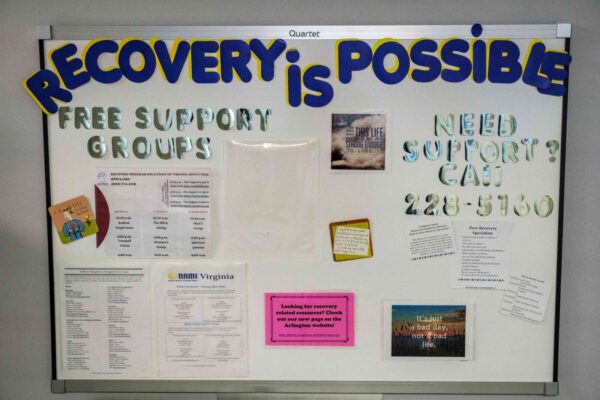
Getting by
Historically, Virginia mostly funded state facilities and wealthy jurisdictions in Northern Virginia, like Arlington County, applied local tax dollars to their community services boards, explains Warren. But as evidenced by the current crisis, even Arlington has room to improve.
“We have a long way to go, and the state has a long way to go,” she said.
VHC Health could break ground on a new mental health and rehabilitation facility at its old urgent care facility on S. Carlin Springs Road as soon as this year.
Arlington County and VHC Health — the new name of Virginia Hospital Center — announced a joint agreement this afternoon to expand behavioral health and rehab services through the proposed project at 601 S. Carlin Springs Road.
The new facility would have 72 beds dedicated to mental health and substance use recovery. This consists of a 24-bed adult unit, a 24-bed youth unit, a 24-bed “recovery and wellness unit” and five outpatient programs, according to a county announcement.
It will have 40 beds set aside for people with brain and spinal cord injuries, those recovering from strokes and those with neurological and other conditions. Currently, the main VHC campus has 20 beds for patients with these needs.
“We are grateful for our continued partnership with VHC Health in developing facilities to meet the healthcare needs of the Arlington community,” County Board Chair Christian Dorsey said in a statement. “With the growing demand, mental health services continue to be a priority. We remain committed to expanding capacity and offering services and support for individuals experiencing behavioral health challenges and their families.”
The chair of the VHC Health Board of Directors, Dr. Russell E. McWey, said this expansion of mental health services “has been a long-time priority for the Board and for VHC Health.”
“The Board is pleased to continue serving our community and to champion this facility and advocate for those who are in need in and around Arlington County,” he said in his statement.
The new S. Carlin Springs Road facility will house five programs: intensive outpatient programs for adults and children, a recovery and wellness intensive outpatient program, an adult partial hospitalization program and an outpatient behavioral health clinic.
VHC had originally intended to add a behavioral health unit to its main campus expansion, Deborah Warren, the executive director of the Arlington Community Services Board and the DHS Deputy Director, told ARLnow. Now, per the announcement, the hospital will instead build a 14-bed geriatric behavioral health unit.
The expansion comes as Arlington, Northern Virginia and Commonwealth as a whole are seeing two trends: deepening mental health needs and greater competition for limited healthcare resources.
Advocates have called the current state of mental health care in Virginia a crisis, one prompted by the state’s decision in 2021 to close most state psychiatric hospitals, which were understaffed due to low wages, hazardous working conditions and Covid.
The closures created a bottleneck at remaining facilities and forced private hospitals, including Virginia Hospital Center, to take in more patients. Sometimes, patients are brought to the hospital by law enforcement, and until they are able to be treated, are left to wait in the emergency room — handcuffed to a gurney under the watch of a law enforcement officer. This situation has contributed to burnout for county social workers and police officers.
In response, Virginia Gov. Glenn Youngkin announced late last year the formation of a task force to come up with ways to remove law enforcement from this process and ensure people get the help they need. VHC Health CEO and President Chris Lane lauded this move in today’s statement.
“VHC Health applauds the Governor and the General Assembly for their commitment to addressing Virginia’s behavioral health crisis and this joint venture will contribute to the Commonwealth’s objective of treating behavioral wellness,” Lane said. Read More
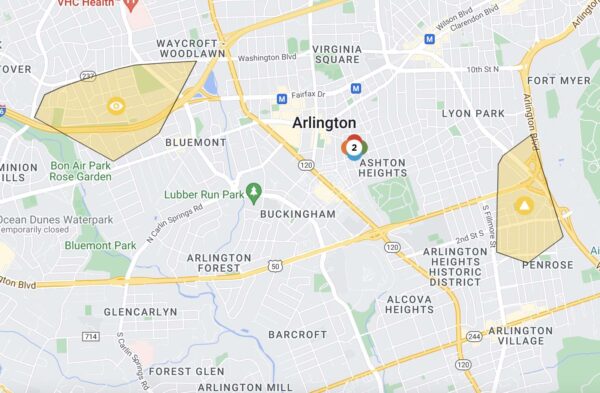
Update at 3:05 p.m. — Numerous small, scattered outages have been reported around Arlington. The number of Dominion customers in the dark is now down to just over 800, with the larger earlier outage since largely resolved.
Earlier: Today’s frigid wind storm is just getting underway — complete with a recent bout of snow flurries — but many are already without power in Arlington.
As of 10 a.m., more than 1,500 Dominion customers are in the cold, according to the power company’s website.
The following outages were reported on Dominion’s map.
- 718 customers, in Penrose and Lyon Park
- 715 customers, between Ballston and Westover
- 114 customers, in Glebewood
- At least two smaller outages in Bellevue Forest and Ashton Heights
The Penrose outage has closed Arlington’s Dept. of Human Services offices at Sequoia Plaza, the county announced this morning.
DHS is closed today. Due to a power outage at Sequoia Plaza, Dept. of Human Services offices are closed today. Client appts will be rescheduled. Sorry for the inconvenience. @ArlingtonVA
— Arlington County Department of Human Services (@ArlingtonDHS) December 23, 2022
“Dominion Energy continues to closely monitor the extremely cold, windy weather and its potential to impact our Virginia and North Carolina service territory,” the company said in a statement today. “Our crews are positioned and ready to respond to any damage or power outages that may be caused as a result of the ice storm.”
“If you experience a power outage, please make sure you report it to Dominion Energy immediately,” the company added. “Please stay at least 30 feet away from all downed wires and damaged equipment. If you need to report an emergency or a downed wire, please call us at 1-866-DOM-HELP (1-866-366-4357)… We appreciate your patience.”
The county is under both a Wind Advisory and a Wind Chill Advisory today. More outages are possible throughout the day, with 50 mph wind gusts expected.
A non-profit is teaming up with the county and schools to provide food assistance to students when classes start up again next week.
Food for Neighbors (FFN), the Department of Human Services (DHS), and Arlington Public Schools (APS) have announced a partnership where food, toiletries, and grocery gift cards will be collected and distributed to students in need on a weekly basis.
The Herndon-based Food for Neighbors has been partnering with Fairfax County and Loudoun County schools for the last five years, but the 2022-2023 school year will be the first working with APS.
FFN will work with students at three high schools initially — Wakefield High School, Arlington Community High School, and the Arlington Career Center — when classes start for the year this coming Monday (Aug. 29).
Renee Maxwell, Community Liaison for FFN, told ARLnow that a “rough estimate is that we’ll be providing consistent, regular support to 200-300 students” to start out. FFN works with the schools and staff to identify the students who are most in need.
The hope, though, is to expand to help more students at more schools soon.
“We’re thrilled to be working with the Arlington County Department of Human Services to bring our programming to Arlington Public Schools,” FFN founder and executive director Karen Joseph said in a press release. “Arlington is a highly diverse, vibrant area, and the expansion provides the opportunity for us to learn about and respond to the needs in the community, so that we may help even more students facing food insecurity.”
The main way FFN collects and distributes items is through its “Red Bag Program.”
That’s where volunteers shop for shelf-stable items, leave them in an FFN-supplied red bag on their doorstep, and other volunteers come pick it up, sort the food, and distribute it to local schools that same day.
The day-long collection event happens five times a school year. The first one to include Arlington is set to happen on October 29. Those who would like to volunteer to donate items are being asked to sign up “well ahead of time.”
Over 1,700 food donors and about 1,200 volunteers have signed up to help across Northern Virginia so far, per a press release.
FFN also provides shelving and cabinets to schools to store the extra food, as well as grocery gift cards and holiday meals.
During the 2021-2022 school year, FFN provided more than 88,000 pounds of food and toiletries to Fairfax and Loudoun County schools. Additionally, more than $105,000 in grocery gift cards were also donated so that students could have access to fresh fruits, vegetables, meats, and other perishables.
Food insecurity continues to be a major challenge in Arlington and across the region. Nearly 8% of Arlingtonians experienced food security recently, according to a report that was released earlier this year.
The rates were particularly high in certain neighborhoods including Glencarlyn, Buckingham, Ashton Heights, Pentagon City, Crystal City, Forest Glen, and Arlington Mill. All three of these high schools that will be served by FFN this coming year have students from these neighborhoods.
What’s more, the federal government ended the free meal program for all students earlier this summer. While students at several county elementary schools will still be able to receive free meals under the Community Eligibility Provision, the sunsetting of free meals nationally could leave some students wondering where their next meal might come from.
The hope is that Food for Neighbors could help fill some of those gaps.
“Through my previous work in Fairfax County, I have seen how influential a partnership with Food For Neighbors can be to address food security for middle and high school students,” DHS Food Security Coordinator Stephanie Hopkins said in a press release. “I know that Arlington community members have a very giving spirit, and I’m confident that they will come through to support the Red Bag Program by donating food and hands-on support.”

What can we do to help those in our community who are experiencing homelessness is a question Triina Van gets a lot.
Van has been Homeless Services Coordinator at Arlington County’s Department of Human Services for about a year and a half. But she has more than two decades of experience working in the field and thinking about this very question.
It’s a difficult one to answer, she says, because the issue of homelessness is “an incredibly complex one.”
ARLnow spoke with Van about how people can help, common misconceptions about those experiencing homelessness, and where people can turn if they need help.
This interview has been edited and condensed for clarity.
What are some of the most common reasons that people in our community experience homelessness?
I’d attribute that to a lot of different reasons. It’s compounded by issues of lack of affordable housing, rents increasing during lease renewals, and challenges associated with not having incomes that can really sustain the cost of living in our community. It can also certainly be compounded by mental health challenges and family violence. There’s also the much deeper systemic roots… woven into our systems with the historical context of our housing policies and how this country has been stood up.
They all contribute to housing loss, housing instability and homelessness.
You noted two different terms there — housing instability and homelessness — what’s the difference?
Yeah, generally when we speak about housing instability, we’re talking about folks who are at risk of experiencing homelessness. That could mean they are contributing over 30%, 40% of their monthly income to rent. Maybe they’re doubled up, living with other families and households to try to make ends meet.
When I’m speaking about homelessness, I’m really talking about people who are sleeping outside, sleeping in emergency shelters.
I think housing instability is a less visible challenge. Arlington is not alone, it’s a nationwide crisis. When they are challenged with this, people often turn to their networks of support like family, friends, congregations, and other communities of faith for assistance.

When people are facing house instability or are experiencing homelessness and need help beyond these networks, where can they turn?
If someone is experiencing homelessness or if you know someone who’s experiencing homelessness, you can call what we call the “1010 line” — that’s 703-228-1010. That’s our main shelter line and can reach someone 24/7, 365 days a year. It’s operated by the Community Assistance Bureau during normal business hours, but we also know homelessness can happen any time of the day. So, it’s also staffed by one of three shelter providers in Arlington who rotate that coverage throughout the non-business hours, overnight, and weekends.
That’s an immediate first step folks can take.
So, what happens after that first phone call?
Staff will complete an assessment to understand the different circumstances people are facing. They’ll look for creative solutions that can help people stay in their housing or find another option that prevents them from entering the homelessness system.
Sometimes, that could be providing temporary financial assistance or maybe negotiation with a landlord to try to prevent an eviction from happening. It could also be more long-term assistance depending on the personal family’s needs. It could also be helping find a new apartment. And, sometimes, people just need a security deposit or first month’s rent.
If the staff can’t assist directly, they have a deep knowledge of other community resources and can help people connect to other options.
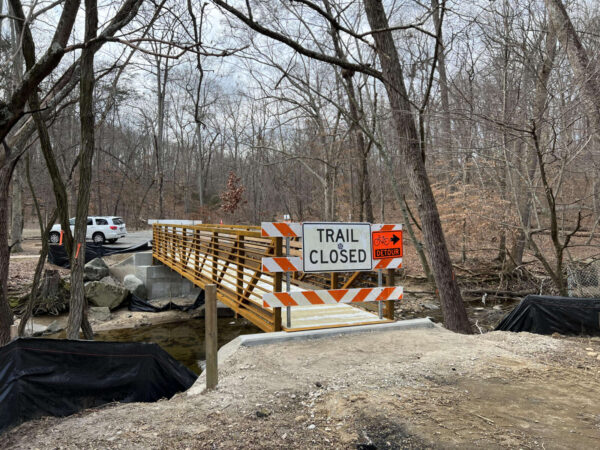
Update at 4 p.m. on 3/15/22 — President Joe Biden has signed a $1.5 trillion spending bill with funding for three projects in Arlington.
In the 10 months it took for the funding to pass, Arlington County substantially completed two of the projects: repaving parts of the Bluemont Junction Trail and replacing a pedestrian bridge in Glencarlyn Park.
The county moved forward with them in the interim due to safety concerns and the uncertain nature of federal funding, Department of Parks and Recreation spokeswoman Susan Kalish told ARLnow on Tuesday.
The funding will pay for any remaining work and Rep. Don Beyer (D-Va.) is considering how to repurpose any unspent funds on similar projects, she said.
Earlier: A $1.5 trillion spending bill that cleared Congress on Friday has funding for three projects in Arlington.
The bill includes $13.6 billion in emergency aid for Ukraine’s fight against Russia and will fund the federal government through September, avoiding an impending government shutdown. Now the 2,741-page bill is headed to the desk of President Joe Biden, who is expected to sign it this week.
The bill also sends Arlington County more than $1.4 million to pay for a health initiative and two parks projects, for which Rep. Don Beyer (D-Va.) requested federal assistance last May. In total, the spending package has $5.4 million earmarked for 10 projects in Northern Virginia, at Beyer’s request.
“This funding will translate to significant, beneficial projects in Arlington, Alexandria, Falls Church and Fairfax County,” he said in a statement on Friday. “I am thankful to my colleagues who enacted the legislation to fund these initiatives, and to the local leaders who worked with me to identify and develop the initial requests. These projects will make a real, positive difference in our region.”
Arlington County’s Department of Human Services is getting $390,000 to purchase two medically equipped vehicles for a forthcoming mobile crisis response team. While not yet in existence, the team will be responsible for responding to behavioral health crises and providing on-site treatment.
The team was a recommendation of the Police Practices Group, which identified about 100 ways policing could be reformed in Arlington, including some ways the county could remove police officers from its mental health crisis response.
The county earmarked $574,000 in the current budget to staff the team with a physician’s assistant, nurse and clinician, and to buy a transport van and operating supplies.
DHS spokesman Kurt Larrick says the vehicles will be purchased once the County Board officially accepts and allocates the federal funding, which will take a couple of months. The mobile crisis response team, meanwhile, is “not up and running yet,” he said.
“County residents do have access to Community Regional Crisis Response services, however, which is a mobile crisis response,” he said. “And our Emergency Services staff can and do go into the community when need arises and staffing allows.”
The county will receive $325,000 to fund repaving and repairs for a segment of the Bluemont Junction Trail and adjacent connector paths. A 2018 trails assessment determined the Bluemont Junction Trail needed significant investments, as the condition of the asphalt is deteriorating in many sections.
The section paid for by the federal government spans the intersection of N. George Mason Drive and Wilson Blvd to the intersection of the trail with the Washington & Old Dominion Trail.
This project is divided into two phases, according to the county. The first phase, completed late last year, updated the main trail and most of its connecting paths. The second phase will update three remaining trail connectors, which need to be realigned to be compliant with the Americans with Disabilities Act. Phase two construction is expected to begin and end this spring and early summer.
Arlington budgeted $550,000 in its 2022-24 Capital Improvements Plan for the project.
The county will also receive $800,000 for the replacement of a pedestrian bridge in Glencarlyn Park. The bridge, lost during the July 2019 flash flooding, was recently installed. The project was part of the adopted 2021 Capital Improvements Plan.
Outside of Arlington, local earmarks in the bill will support storm sewer and climate resilience improvements in the City of Alexandria and Falls Church City and improve information technology services in Fairfax County. It will also support a pilot program for the deployment of body-worn cameras in the Alexandria Police Department and safety improvements to the GW Parkway.
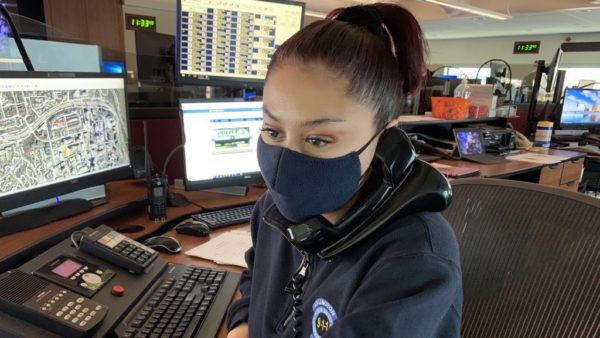
Arlington County is developing an alert system aimed at improving its emergency response to behavioral health crises.
The aim of the system, dubbed the Marcus Alert, is to keep people in crisis — due to a mental illness, substance use disorder or intellectual and developmental disabilities — from being arrested and booked in jail.
It comes from the Marcus-David Peters Act, which was signed into law in late 2020 and is named for Marcus-David Peters, a 24-year-old biology teacher who was killed by a police officer in 2018 while experiencing a mental health crisis.
Once operational, the system would transfer people who call 911 or 988 — a new national suicide and mental health crisis hotline — to a regional call center where staff determine whether to de-escalate the situation over the phone, dispatch a mobile crisis unit or send specially trained law enforcement.
Last summer, Arlington began developing its Marcus Alert plan, a draft of which needs to be submitted to the state by May 22. It’s asking residents to share their experiences with the county’s current behavioral health crisis response via an anonymous and voluntary survey open through mid-March.
Locals can also email the county to sign up to participate in focus groups, which will convene in early- to mid-March.
State law requires that the county’s final plan be implemented by July 1.

“We are hopeful that with the Marcus Alert and increased community outreach and co-response, we will see a reduction in arrests of people with [serious mental illnesses],” Suzanne Somerville, the bureau director of residential and specialized clinical services for Arlington’s Department of Human Services, tells ARLnow. “The system is tremendously strained at this time and hospitalization for people that need it for psychiatric symptoms is not always easy to attain.”
DHS attributes the strain to COVID-19 and a lack of beds in state-run mental hospitals after the Commonwealth closed more than half of these hospitals to new admissions amid its own workforce crisis. This overwhelmed local hospitals and the Arlington County Police Department, and drove fatigued DHS clinicians and Arlington police officers to quit.
“Everyone is trying to do the right thing and get the client the services they need and deserve and we just don’t have the resources currently,” said Aubrey Graham, the behavioral health program manager for the Arlington County jail.
Bed shortages also impact court hearings, as many inmates with mental illnesses require competency restoration services to understand court proceedings and work with their defense attorney. Graham says inmates must go to Virginia Department of Behavioral Health and Developmental Services state hospitals, which limits beds even more.
Compared to other jurisdictions, Arlington sends proportionately more people to Western State Hospital for competency restoration, per data ARLnow requested from DBHDS. It also saw the greatest increase in admission rates between 2020 and 2021.

Graham says she doesn’t know of any studies that explain why Arlington sees so many individuals with serious mental illnesses, but geography plays a role, as about 70% of people sent to state hospitals come from D.C., Maryland and other parts of Virginia. Only about 30% of those sent to state hospitals from Arlington are actually Arlington residents.
“Although there are a high number of competency evaluations requested in Arlington courts, the referrals are entirely appropriate, and most are deemed incompetent to stand trial,” Graham said.
That’s why police should not arrest them in the first place, says Chief Public Defender Brad Haywood, adding that people with mental illnesses are over-represented in the county jail, which is seeing a continued inmate deaths and may not have the resources to treat the needs of the mentally ill.

A local pilot program to give up to 200 qualifying low-income residents $500 a month for two years, no strings attached, will move forward without any public funding.
For a few months last fall, Arlington County was poised to spend either federal or county money on “Arlington’s Guarantee,” a guaranteed income pilot program launched by nonprofit Arlington Community Foundation.
This commitment fell through, however, when the county and ACF realized any infusion of public funding would have put participants at risk of losing their government benefits, such as child care subsidies or food stamps.
“It would put them back instead of putting them forward,” says Anne Vor der Bruegge, ACF’s Director of Grants and Initiatives.
She and Department of Human Services spokesman Kurt Larrick call this income precipice the “benefits cliff.” The little additional income would make the fall particularly painful in Arlington given its high cost of living.
“The issue was that in order to give money to recipients and then not push them off the benefits cliff — where, for example, they lose SNAP because they make too much income — and to make the net effect of receiving the cash zero, we had to get a waiver from the Virginia Department of Social Services (VDSS),” Larrick said.
He added that with the waiver, the monthly stipend “would not count as income in the calculation of benefits, and no one who joined the program would lose benefits by being ‘over income.'”
But this waiver only works if the program is 100% privately funded. Last year, the county and ACF learned that neither the county’s original plan to use American Rescue Plan Act funding nor its revised plan to use unspent funds from the 2021 fiscal year would have worked.
“The County decided to rescind the plan to give ARPA money so as to not negatively impact the recipients,” he said. “Using closeout funds would have created the same issue.”
ACF’s wide donor base ensures this loss of funding won’t impact the program’s trajectory, says Vor der Bruegge, but it may slow it down slightly.
“We had intended all along for it to be privately funded from the get-go: that is, through individual people, philanthropic organizations and corporate dollars,” she said, adding that the ARPA funding “evolved as an opportunity we didn’t plan for or seek out.”
County contributions would have allowed ACF to enroll all 200 participants immediately, she says. Now, ACF will resume its plan to continue accepting donations until it reaches 200 participants.
So far, 105 residents are receiving money directly onto debit cards through the program. ACF will continue expanding enrollment in groups of 25, as funding becomes available, up to 200 people. Donations benefit participants directly, says Vor der Bruegge, as ACF obtained a grant to cover the program’s operating costs.
The “benefits cliff” issue is not exclusive to Arlington.
Vor der Bruegge says it hurt nascent guaranteed income programs across the state and nation that were counting on ARPA funding, she said. These programs are proliferating right now because federal stimulus checks normalized the idea of automatic payments to residents — and many were latching onto ARPA funding.
Now, they’re having to “go back to the drawing board,” she said, adding that some states are introducing legislation to override this unintended consequence.
“It is pretty prevalent across the country,” she said.

